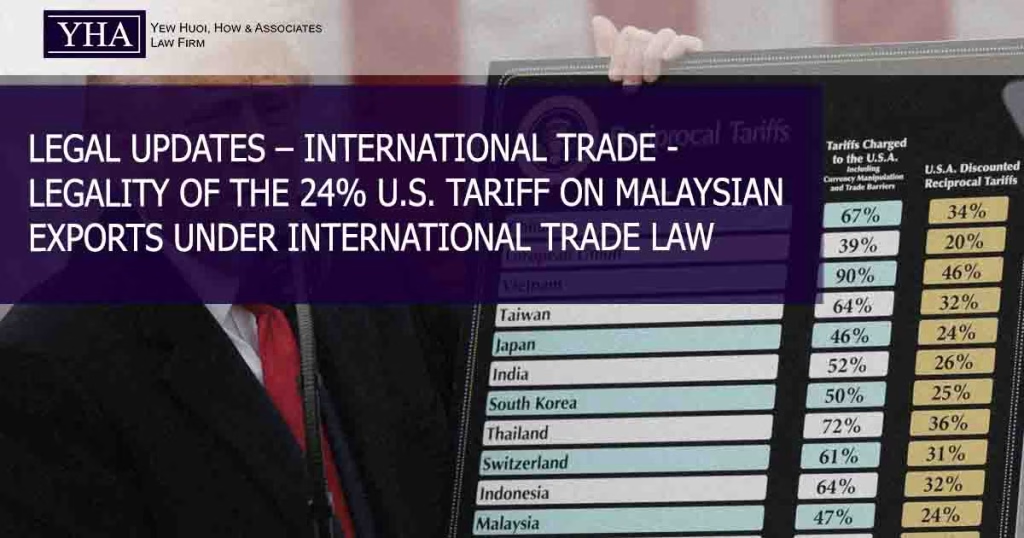1. Background:
In 3.4.2025, the United States imposed a sweeping 24% ad valorem tariff on virtually all Malaysian exports to the U.S., on top of a new 10% universal baseline import duty. The measure was part of a broader “reciprocal tariff” policy by the U.S. government aimed at countries with significant trade surpluses and alleged high barriers to U.S. goods. Malaysia, with a trade surplus of approximately USD24 billion in 2024, was among the countries targeted.
2. Key Legal Issues:
The central question is whether the U.S.’s unilateral imposition of a 24% country-specific tariff on Malaysia violates its obligations under international trade law, particularly the rules of the World Trade Organization (WTO).
3. WTO Legal Framework
Under the General Agreement on Tariffs and Trade (GATT 1994), which governs WTO members:
i. Article I: Most-Favoured Nation (MFN) prohibits discrimination among WTO members. Imposing a higher tariff solely on Malaysian goods contravenes this obligation.
ii. Article II: Tariff Bindings requires members to maintain tariffs within bound rates agreed in their WTO schedules. A sudden 24% increase far exceeds U.S. bound rates and breaches this provision.
4. Possible U.S. Justification
- Article XX (General Exceptions) – The U.S. could argue that the tariffs are necessary to protect public morals or secure compliance with its laws. However, WTO panels have previously rejected similar arguments, such as in the U.S.–China tariff dispute (DS543), where the U.S. failed to prove that such unilateral tariffs were justified.
- Article XXI (Security Exception) – The U.S. might attempt to defend the tariff under national security grounds. Yet, WTO precedent (e.g., Russia – Traffic in Transit) clarified that Article XXI cannot be self-judging and must involve a genuine emergency in international relations. There is no such emergency between the U.S. and Malaysia.
5. Likely WTO Inconsistency
Based on WTO jurisprudence, the 24% tariff on Malaysian goods is likely:
- A violation of MFN treatment under Article I
- A breach of U.S. tariff binding commitments under Article II
- Not justifiable under Article XX or XXI
6. Malaysia Legal Options:
- WTO Dispute Settlement: Malaysia may initiate a case against the U.S. for breach of WTO rules. Given the strong legal merit, Malaysia would likely win. However, enforcement may be stalled due to the current paralysis of the WTO Appellate Body.
- Diplomatic Engagement: Malaysia has already indicated it will pursue discussions under the U.S.-Malaysia Trade and Investment Framework Agreement (TIFA) to seek a resolution.
- Multilateral Pressure: Malaysia can align with other affected countries (e.g., Vietnam, Thailand, EU) to collectively challenge the measure, adding diplomatic and legal weight.
- Retaliatory Measures: Although currently ruled out, Malaysia could consider retaliatory tariffs if authorized by the WTO following a successful ruling.
7. Conclusion:
The 24% U.S. tariff on Malaysian exports appears legally indefensible under WTO law. Malaysia has strong grounds to challenge it through dispute settlement, though practical remedies may be delayed. In the interim, Malaysia is wisely pursuing diplomatic avenues while preserving its legal rights under the multilateral trading system.

